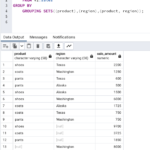This post demonstrates how to list all tables for a specific MySQL database. I will use SHOW TABLES for this.
First, login as user root to your MySQL instance.
[sourcecode language=’sql’]
mysql -uroot -pYourPassword
[/sourcecode]
Now change to the database you want to show tables for.
[sourcecode language=’sql’]
USE mysql;
[/sourcecode]
Database changed
Now you can produce the list.
Run this:
[sourcecode language=’sql’]
SHOW TABLES;
[/sourcecode]
+---------------------------+ | Tables_in_mysql | +---------------------------+ | columns_priv | | db | | event | | func | | general_log | | help_category | | help_keyword | | help_relation | | help_topic | | host | | ndb_binlog_index | | plugin | | proc | | procs_priv | | servers | | slow_log | | tables_priv | | time_zone | | time_zone_leap_second | | time_zone_name | | time_zone_transition | | time_zone_transition_type | | user | +---------------------------+ 23 rows in set (0.14 sec)
As with SHOW DATABASES, you can look for specific tables or tables containing specific text in their names.
[sourcecode language=’sql’]
SHOW TABLES LIKE ‘slow_log’;
[/sourcecode]
+----------------------------+ | Tables_in_mysql (slow_log) | +----------------------------+ | slow_log | +----------------------------+ 1 row in set (0.00 sec)
With wildcards…
[sourcecode language=’sql’]
SHOW TABLES LIKE ‘time{3a76cbff1b5ce5ace3bd34bbdd68f71285d81fb9af60114c7a6db80d3a8688de}’;
[/sourcecode]
+---------------------------+
| Tables_in_mysql (time{3a76cbff1b5ce5ace3bd34bbdd68f71285d81fb9af60114c7a6db80d3a8688de}) |
+---------------------------+
| time_zone |
| time_zone_leap_second |
| time_zone_name |
| time_zone_transition |
| time_zone_transition_type |
+---------------------------+
5 rows in set (0.00 sec)


Leave a Reply